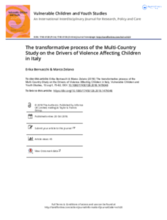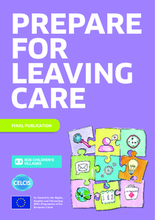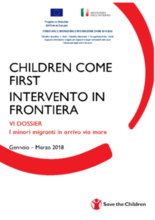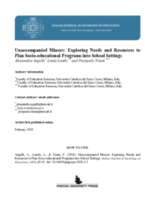Displaying 51 - 60 of 95
As part of the "Children Come First: Intervention at the border" project, Save the Children Italy elaborates and disseminates, on a quarterly basis, a dossier containing quantitative and qualitative information (profiles) relating to migrant minors entering Italy. This dossier contains information relating to the period July-October 2018.
This article reflects on the process of the Multi-Country Study on the Drivers of Violence Affecting Children in Italy.
This publication from SOS Children's Villages and CELCIS describes the two-year project 'Prepare for Leaving Care,' which aimed to "embed a child rights based culture into child protection systems which improves outcomes for children and young people in particular in the preparation for leaving care," with youth participation at the heart of all activities.
As part of the "Children Come First: Intervention at the border" project, Save the Children Italy elaborates and disseminates, on a quarterly basis, a dossier containing quantitative and qualitative information (profiles) relating to migrant minors entering Italy. This dossier contains information relating to the first quarter of 2018.
The present research aimed to describe and compare three new second-level intervention models to improve the care of unaccompanied migrant minors in Italy.
The focus of this paper is an evaluation of educational projects which have been designed and operated for the reception of unaccompanied minors in a series of Italian schools.
The present study concerning domestic adoption explored the adjustment of 37 adolescents and 22 emerging adults (with age ranging between 11 and 18 and 18 and 24 years, respectively), adopted through an Italian form of open adoption, and analyzed the quality of adoptive family relationships and adoptees' attachment as possible moderating variables in the relation between multiple pre-adoptive risk factors and adoptees' outcomes.
As part of the "Children Come First: Intervention at the border" project, Save the Children Italy elaborates and disseminates, on a quarterly basis, a dossier containing quantitative and qualitative information (profiles) relating to migrant minors entering Italy. This dossier contains information relating to the last quarter of 2017.
The aim of this report from SOS Children's Villages is to increase the knowledge and understanding of the needs and rights of young people ageing out of alternative care around the world, in order to inform strategies, policies and services to improve their life chances and outcomes through appropriate preparation for leaving care as well as after-care support.
The chapter presents a critical analysis of the reception system for non-asylum seeking unaccompanied migrant children in Calabria, a region of South Italy.







